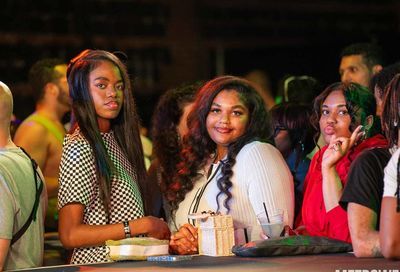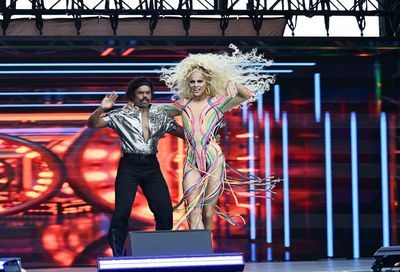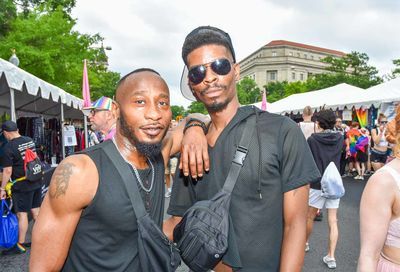Yola is Saying the Quiet Parts Out Loud
Yola speaks about shared humanity, genre-fluidity, Aaron Lee Tasjan, and the enduring power of Sister Rosetta Tharpe.

“I was just saying all the quiet bits out loud, but it was overdue,” Yola says, reflecting on a TED Talk she recently gave. “I just don’t hear this stuff enough in mainstream enough spaces, and so looks like it’s going to be me.”
Lending her voice to the things that nobody else is saying is the Bristol-born, Nashville-based artist’s M.O., and it seems to have resonated widely. “The nature of the record is one that speaks to, frankly, anyone who’s ever felt like an other, ever, in any space,” she says of the reception to her Grammy-nominated 2021 album, Stand For Myself. “Which is quite a lot of people on earth!” she adds with a laugh.
That warm reception has followed Yola well past the album’s release. She lights up when talking about the audience at her shows, describing a cross-section of humanity that encompasses Black trans women, old white grannies, twinks, emos, frat bros, and random men in cowboy hats.
“The crowd looked like earth! It looked like so many different permutations of humanity, so many different backgrounds, so many different permutations of the LGBTQIA+, so many different kinds of people who you would be like, ‘Okay, how did they find their way here?'”
For Yola, one powerful feeling that unites such a broad coalition of fans is the near-universal impulse to apologize for taking up space in a world that has made you acutely feel your own otherness.
Apart from finding a point of connection with a wide audience, Yola’s perceptiveness to that feeling of being othered has also allowed her to be purposeful in her collaborations. In this frame of mind, asking Brandi Carlile to do backing vocals on “Be My Friend” was an obvious choice.
“Yes, we can talk about it from a minority standpoint of allyship, but we could also talk about it from LGBTQIA+ standpoint, so let’s call my girl.”
Finding and embracing those points of connection can allow for spontaneity in the process, too, as it did when she came up with the idea for “Diamond Studded Shoes” with queer singer Aaron Lee Tasjan.
“It came out of a slumber party-style conversation,” she says. “He was just strumming away on a guitar, and I was like, ‘I feel like I’ve got an idea coming, buddy. You might want to keep playing that.’ So it was really organic.”
For Yola, it’s all of a piece. “I try and represent everyone that I love, which is people from very vastly different backgrounds and different persuasions. That’s how I show love.”
Yola’s way of showing love through deliberate inclusion invites a parallel with one of her icons: Sister Rosetta Tharpe, the godmother of rock-and-roll and the subject of her recent TED Talk. Yola, who describes herself as a “staunch fan” of Tharpe, bristles at the ambivalence with which Tharpe is treated in the wider discourse.
“I’ve been kind of pissed about the way that she’s been described for a long time!” Yola, who recently made her acting debut playing Tharpe in Baz Luhrman’s Elvis, wanted to be sure that she did justice to the artist and her foundational role in shaping the entire musical landscape of the 20th century. “This whole not doubling down or plugging down on exactly how important she’s been to contemporary music at large, just really being so ambiguous with what she actually did. She literally invented a style of guitar playing from scratch!”
Yola’s admiration for Tharpe goes beyond her importance in music history and incredible talent as a musician in her own right.
“I am never going to stop waxing lyrical about how important she is, but also, just the number of Black female narratives that are diminished, or especially if they’re slightly plus and slightly darker than a brown paper bag,” she says. She has a great admiration for the way Tharpe took it upon herself to support and uplift her contemporaries — particularly other Black and queer artists.
On Tharpe’s role in launching the career of Little Richard, she says, “You don’t get that in the ’50s with a buttoned-up executive in the South. You get that from a queer woman who’s like, ‘Sure, this is a safe space.'” Much like Tharpe, Yola sees the power in people who have been othered taking things into their own hands.
“For anyone that is queer or anywhere on the spectrum of LGBTQIA+,” she says, “they know how important safe spaces are. All of these narratives are so profoundly important to music history because then it doesn’t allow the narrative to be colonized by cis white maledom.”
For her part, Yola is keen to reclaim that narrative from its gatekeepers, including rejecting the boxes she is often put into.
“Broadly,” she says of people’s tendency to jump to associate her with one genre or another, “it’s a confusing space that I inhabit, which is why I went out of my way, especially with this record, to define my space as genre-fluid.”
More than an issue of simple categorization, she links her embrace of genre-fluidity to her own frustration with reductive parallels and lazy comparisons and the flattening effect it has on how she and other artists are received.
“It’s almost as though conflating Black women with guitars to country/country Americana — but always the presence of country in there — is a way of bringing all of our stories together. I think it’s something we need to be talking about now, this idea of making the Black female narrative in non-hip-hop, R&B based genres, reductive.”
For Yola, then, the term genre-fluid is not just about defining and categorizing her art — it is about doing so on her own terms. “The chance to self-define and be specific and be non-monolithic,” she says, “that’s never not going to be important for any demographic that has felt other.”
Yola appears at The Lincoln Theatre, 1215 U St. NW, in Washington, D.C. on Saturday, Sept. 24 at 8 p.m. General admission. The show is currently sold out, but tickets can be requested through the Lyte exchange. Visit www.lincolntheatre.lyte.com/3704202.
To learn more about Yola, visit www.iamyola.com.
Support Metro Weekly’s Journalism
These are challenging times for news organizations. And yet it’s crucial we stay active and provide vital resources and information to both our local readers and the world. So won’t you please take a moment and consider supporting Metro Weekly with a membership? For as little as $5 a month, you can help ensure Metro Weekly magazine and MetroWeekly.com remain free, viable resources as we provide the best, most diverse, culturally-resonant LGBTQ coverage in both the D.C. region and around the world. Memberships come with exclusive perks and discounts, your own personal digital delivery of each week’s magazine (and an archive), access to our Member's Lounge when it launches this fall, and exclusive members-only items like Metro Weekly Membership Mugs and Tote Bags! Check out all our membership levels here and please join us today!

























You must be logged in to post a comment.